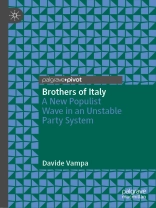This volume examines the origins, ideology, organisation, leadership, political alliances, electoral performance and institutional role of the right-wing party Brothers of Italy (Fratelli d’Italia, Fdl). Fd I’s meteoric rise is only the latest in a series of shocks that have hit Italy’s unstable political system in recent years. However, it would be a mistake to brand Fd I as yet another Italian anomaly. Indeed, the party stands at the crossroads between an established political tradition, that of the post-fascist and conservative right, and the more recent populist waves that have affected many mature democracies. By placing Giorgia Meloni’s party in a comparative analytical framework, the author shows that its success stems from a mix of past legacies and current developments seen in much of Europe (and beyond): the growing role of right-wing female leaders and their reliance on new media; the mainstreaming of the far right mixed with populist repertoires; the de-alignment and (partial) re-alignment of voters; the reconfiguration of electoral geographies; and ultimately the emergence of an illiberal model of democracy. In short, rather than being an exception, Fd I can be seen as one of the most recent and advanced manifestations of a broader process of political change sweeping the West.
Cuprins
Chapter 1: Brothers of Italy and right-wing populism in Italy.- Chapter 2: The Ideology and Programmatic Positions.- Chapter 3: Party Organisation and Leadership.- Chapter 4: Friends and Enemies.- Chapter 5: Brothers of Italy in the Electoral Arena and Representative Institutions.- Chapter 6: Conclusion: A New Populist Wave?.
Despre autor
Davide Vampa is Senior Lecturer in Politics at Aston University, UK. His work focuses on transformations in democratic representation, rising populism and the links between territorial party politics and public policy.












